Multiple outlets reported yesterday and today on persistent bipartisan skepticism in Congress towards the Obama administration’s stance on Iran, with the White House meeting resistance as it tries to convince lawmakers that they should wait for the formal implementation of a recently announced interim agreement – which would subsequently be followed by a minimum of six months of negotiations – before passing any new legislation pressuring the Islamic republic. The State Department last week formally acknowledged that the Geneva agreement between the P5+1 global powers and Iran had not yet come into force, giving Iran a window during it could continue its nuclear activity without regard to the deal, even as the anticipation of reduced sanctions began to ease Iran’s economic isolation. Politico quoted Rep. Rick Larsen (D-WA) expressing frustration over the sequencing.
“Iran hasn’t taken steps yet to implement what it is supposed to do so we have not taken any steps,” said Rep. Rick Larsen (D-Wash.). “We shouldn’t step first. The world isn’t concerned about sanctions. The world is concerned about Iran’s nuclear program.”
The outlet more broadly described how ‘despite nearly two hours of questioning from lawmakers, concerns linger among both Democrats and Republicans,’ including over language in the Geneva agreement that allows Iranian scientists to continue expanding their stockpile of enriched material. Foreign Policy Magazine (FP) had earlier in the week noted that “like perhaps no other foreign policy issue, Iran sanctions have pitted President Obama against a sizeable portion of his own party,” and revealed that a bipartisan group of Senate lawmakers was “closing in on legislation that would impose new sanctions on Tehran after six months.”
In the latest sign of Democrats’ open willingness to cross the administration, Menendez accused the White House of “fear-mongering” in its claims that new sanctions legislation would kill the nuclear deal and lead to war with Iran. “As one of the architects of the sanctions regime we’ve had on Iran, this is exactly the process that has brought Iran to the negotiating table,” Menendez told Face the Nation on Sunday. “While we have heard naysayers in the past say, no, we shouldn’t pursue those sanctions, it seems to me that prospectively looking for sanctions that are invoked six months from the date of enactment … sends a message to Iran, as it has throughout this process, that there is a consequence if you don’t strike a successful deal.”
Journalists have for weeks been pressing administration officials on exactly that tension.
[Photo: PBS NewsHour / YouTube]




